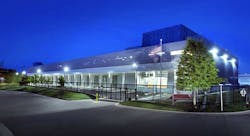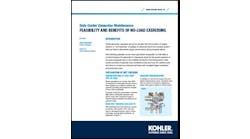Northern Virginia: America’s Largest Data Center Market
We continue our series of stories on the leading geographic markets for data center space. Data Center Frontier is partnering with DatacenterHawk to provide in-depth market reports on each city we profile.
Northern Virginia is the largest data center market in the United States, and the most active. It is currently poised for a data center building boom, befitting its status as the primary on-ramp for major cloud computing platforms. The region is poised for powerful growth as the leading data center REITs and colocation providers race to provide capacity for fast-growing cloud service providers and the digital businesses that seek to connect to these clouds.
Data Center Frontier Special Report: The Northern Virginia Data Center Market. Download It Now.
The Northern Virginia data center market is spread across a number of towns in Loudoun and Prince William counties. At the heart of the region’s geography and success is Ashburn, which has become known as “Data Center Alley” for its concentration of mission-critical facilities. Ashburn sits atop the world’s densest intersection of fiber networks, making it an ideal location to store and distribute data. It is unique in its connectivity, and its data centers are laying the physical foundation of the digital economy.
Northern Virginia is the largest market for data center space in the U.S., home to 4.6 million square feet (SF) of commissioned data center space, representing 616 megawatts (MW) of commissioned power, according to market research from datacenterHawk. Demand for space is very strong, as reflected in the vacancy rate of just 6.3 percent in the region.[clickToTweet tweet=”Northern Virginia is home to 4.6 million SF of data center space and 616 megawatts of commissioned power.” quote=”Northern Virginia is home to 4.6 million SF of data center space and 616 megawatts of commissioned power.”]
Many of the trends that have shaped the data center industry have emerged first in Northern Virginia, which began as a retail colocation market, but has since seen early adoption of wholesale data suites, “super wholesale” leases spanning multiple data halls, and now build-to-suit cloud facilities.
The Northern Virginia data center market supports 616 megawatts of commissioned power and 4.6 million square feet of space. (Graphic: DatacenterHawk)
The past year has seen a super-sizing of cloud requirements, with a handful of deals in excess of 16 megawatts, and some in excess of 30 megawatts. Meanwhile, the region continues to see demand for traditional colocation space for enterprises, content companies, IT integrators and government agencies.
As a result, the Northern Virginia market provides an unusual number of market niches for service providers, and options for customers seeking space.
In 2017 the biggest question facing the Northern Virginia market is whether the supply of data center space can keep pace with leasing demand. Data center developers are responding to the surge in demand by building larger data centers, including multi-story facilities, in a bid to create as much capacity as possible from their existing real estate.
As the region’s building boom continues, expect increased competition for the dwindling supply of development sites suitable for data centers. That’s reflected in higher sale prices for well-positioned sites. Last month Equinix paid $1 million an acre for a 34.5 acre parcel in Ashburn for future data center development. The Loudoun County economic development team is identifying additional sites that may be appropriate for data centers.
Why Northern Virginia?
Northern Virginia is the largest data center market in the United States. This extremely mature and well connected area traces its roots to the U.S. Government’s experiments in wide area fiber optic networking in the late 1960s. The low-latency connections to the national fiber network backbone, along with a relatively business-friendly environment, make Northern Virginia the top market for data centers serving the area’s biggest public and private enterprises.
Northern Virginia is the largest data center market in the U.S. for the following reasons:
- Fiber Connectivity — The area has the highest density of dark fiber in the world, providing scalable bandwidth and low latency connections to the Internet backbone.
- Competitive Colocation/Cloud Environment — The Northern Virginia market has the largest presence of colocation and cloud providers in the United States, creating a very competitive environment
- Strategic Location — The Northern Virginia market provides a strategic, cost-effective market for companies needing their data center in the northeastern United States
- Relatively Free of Natural Disasters — Other than occasional high winds and rain from hurricane remnants, the Northern Virginia market is typically very safe.
- Affordable and Reliable Power Cost — Northern Virginia’s power costs are competitive among major colocation markets and is reasonable considering the total cost of occupancy for long-term requirements. The primary power utility, Dominion Virginia Power, has a track record of reliable delivery for data centers.
- Business Climate — Loudoun County is the number one county in America for personal income, with an average household income of $125,900, according to the Census Bureau, and a skilled labor force and unemployment rate of 3.3 percent. Virginia has a sales tax exemption for data center customers that goes through 2035.
In our next article, we’ll take a look at supply and demand trends in the Northern Virginia data center market.
For full details on the Northern Virginia market, we invite you to download the Data Center Frontier Special Report: The Northern Virginia Data Center Market.






